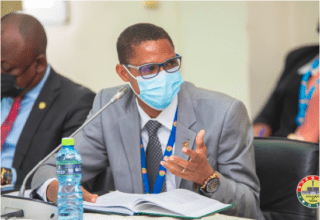Mr Kofi Ansah, the founding Chief Executive of the Minerals Commission, and Mr Fui Tsikata, a lawyer with 45 years experience in mineral and energy law, have urged the government to halt the Agyapa Royalties Investment Ltd, which is set to list on the London Stock Exchange (LSE) and the Ghana Stock Exchange before the end of the year.
In an article, the pair argue that there is no reason to rush to implement the transaction by the end of this year.
They want the deal to be halted in “everybody’s interest” to allow for more stakeholder engagement.
What the Government reportedly expects to get from the sale of shares in the Jersey company is US$500 million. At an average gold price of US$1800 an ounce, the Government would get more than US$400 million in 2021 if it kept its right to receive all the royalties from the eleven producing mines. There is no reason why in order to get US$500 million now, we should rush into this transaction at the risk of losing substantial future income.
If the purpose of the transaction is to stabilise Government income, how does converting a direct right to receive royalty from mining companies into a right to receive dividends, if and when declared, from a company to whom the miners pay the royalty achieve that?
In our view, it would be in everybody’s interest for the Minister of Finance to freeze the implementation of this transaction. This would have the effect of taking the discussion outside the election cycle and give more opportunity for it to be considered openly and dispassionately.
Read the entire article below;
A STATEMENT ON THE AGYAPA ROYALTIES TRANSACTION by Kofi Ansah & Fui S. Tsikata
Kofi Ansah, the founding Chief Executive of the Minerals Commission, and Fui Tsikata, a lawyer with 45 years experience in mineral and energy law and policy, have argued for the freezing of the controversial Agyapa Mineral Royalties deal.
In a statement, they said putting the deal on hold will be in “everybody’s interest”. They feel halting the deal will allow for dispassionate discussions outside the context of the 2020 election cycle.
Find below their full article
We have each been involved in the Ghana mining sector for almost four decades, including participating in critical reforms of its regulatory regime. We are gravely concerned about the transaction by which 75.6% of royalties payable to Government over the life of a number of mining operations are being assigned to a Jersey incorporated company and its Ghanaian affiliate. While the Jersey company will initially be owned a hundred per cent by a Government entity, the object, reportedly, is to sell just under half of its shares for US$500 million.
We appreciate that expressing our views on this transaction at this time is likely to feed into the mill of party political partisanship. However, we cannot for that reason disable ourselves from speaking, given the potential implications the transaction has for national revenue far into the future. From all the information available to us, it is hard to overcome the apprehension that were the transaction to go ahead on its current terms, the royalty rights (including from stable, established producing mines) would be given up at a gross undervalue.
If we were to assume that gold prices will drop from the current US$1900+ an ounce to, let us say, US$1500 for the period 2020 to 2023, on current production projections the royalty revenues from just the eleven existing producing mines for those four years that would be transferred to the Agyapa companies under this transaction would, in 2020 money, be more than US$1 billion. This does not include future royalties from mines coming onstream imminently such as those at Obuasi and the highly promising Namdini mine, near Bolgatanga. Nor does it include post-2023 projected production of the eleven mines.
The right to royalties is being assigned to Agyapa in respect of at least fifteen mines or prospective mines, including all the existing, established mines, effectively for an indefinite future. The agreements say that Agyapa’s rights continue not only for the duration of any leases granted to the mining companies, but also for as long as their leases are renewed. The maximum duration of a mining lease is thirty years. The grant of a right to those royalties for that duration is in itself a substantial right. A right to royalties not only for the original term but also for every extended period upon renewal of a mining lease is even more substantial. In these circumstances, it is hard to see the basis on which these rights have been valued at US1 billion as the agreements clearly state.
The royalty rate payable by each mining company is known. What gold price projections did the Government’s advisers use to determine their valuation? What projections of the quantities mines included in the list would produce and over what period were used in arriving at the US$1 billion valuation?
We cannot see that there is any reason to rush to implement the transaction by the end of this year as is targeted in the relevant documents.
What the Government reportedly expects to get from the sale of shares in the Jersey company is US$500 million. At an average gold price of US$1800 an ounce, the Government would get more than US$400 million in 2021 if it kept its right to receive all the royalties from the eleven producing mines. There is no reason why in order to get US$500 million now, we should rush into this transaction at the risk of losing substantial future income.
If the purpose of the transaction is to stabilise Government income, how does converting a direct right to receive royalty from mining companies into a right to receive dividends, if and when declared, from a company to whom the miners pay the royalty achieve that?
In our view, it would be in everybody’s interest for the Minister of Finance to freeze the implementation of this transaction. This would have the effect of taking the discussion outside the election cycle and give more opportunity for it to be considered openly and dispassionately.
Source: graphic.org.gh

















